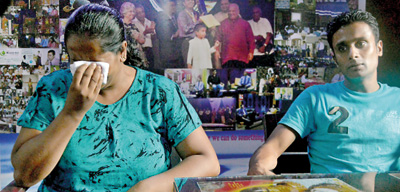News
Rejected by society, shunned by schools, these kids need help
As a tug-of-war continues between four ministries, officials are failing to find a way to support children with special needs, especially those with intellectual disabilities. Lacking proper treatment, rejected from schools, and little public awareness of the challenges the children and social stigma the children face, parents are left with very little access to help.

Sadika and Samantha: Faced many hurdles when seeking help for their autistic child
Single parent Rajitha Priyadarshini from Kolonnawa has a six-year-old daughter who was diagnosed with autism at the age of two. Rajitha and her husband had no idea what her child was going through or why she was different from other children. Her husband died when the child was two-and-a-half years old, and Rajitha, now 34, had another baby to tend by that time.
Autism is an intellectual disability; a child with autism will have great difficulty in communicating and interacting with others.“We realised that something was wrong when our child did not talk. We went to the Lady Ridgeway Hospital and the doctors there said that our child had autism. We did not know what this was and the doctors did not explain either,” Rajitha said.
For the past years Lady Ridgeway Children’s Hospital in Colombo stands as the sole institution that treats children with disabilities. With very little knowledge of what was going on, the single parent struggled on. “I tried to put her to a Montessori but she was rejected by several places. None of the teachers were willing to take my child. They said that other children would be affected by my child’s behaviour.
“When she was older, state schools rejected her. I did not know what to do,” Rajitha sobbed, recalling the cruel comments school authorities had made about her child. They said a past karma was the reason for such a disability. Other parents shunned Rajitha’s daughter. She was rarely invited to birthday parties. When she was, Rajitha rarely took her because “other parents did not like having a different child around their normal children”.
Samantha Niluka from Badulla also has a child with autism. The girl, now six years old, did not appear to be like a normal child when she was born in Badulla hospital. She did not cry. “I pursued doctors, pleading them to check on my baby. There was something wrong but no one paid any heed. Some doctors even asked me to be quiet and not make an issue,” said Sadika Nilangi, 31, Samantha’s wife.
When the child was several years older the doctors told them consult a child psychiatrist at the Lady Ridgeway. “There, the doctors simply said that the child had autism. We did not know what the term meant. They did not bother to explain,” Samantha said. Their daughter was put on treatment and once in two months they were told to visit the hospital. But was this enough?
“They asked us to do several exercises at home but we saw that this was not helping. Our child needed constant attention,” he said. With no friends or any relatives they moved to Colombo in the hope of getting treatment for their child. Since moving in Samantha had to change jobs more than 10 times because he could not keep up his working hours while taking his daughter for treatment.
They had to take endless bank loans to keep up with expenses. The government homes they went to did not have the proper equipment or human resources to carry out a successful treatment for such children. “We were helpless. Nothing was working. Society, because they weren’t aware of these conditions, looked at us and our child in a very cynical way. We were mentally down and we simply could not go on. We wanted hope. Someone to say that things will be fine,” Samantha said.
Fortunately, they found out about a private home in Borelesgamuwa which gave in-house treatment to autistic children. Now their child is much better and improving. The government does not have reliable statistics of the number of children who are having intellectual disabilities. Four ministries (Health, Social Services, Education and Child Development and Women’s Affairs) came together in early 2012 to look at the issue and help such people. Yet the problem silently lingers in all parts of the country.
Although an action plan was put together by the four ministries only the Education and Health Ministries received funding from the government for their part of the work. “We believe in rehabilitation, counselling and helping families with a child with a disability to be empowered. Parents tend to hide when they have such a child because of the social stigma attached. What we want is to educate the society and to help affected families,” said M.R. Shanthakumara, National Co-ordinator for the Community-Based Rehabilitation for Persons with Disabilities division in the Social Services Ministry.
He said intellectual disability was a growing problem that needed to be addressed immediately but the programme was not fully funded by the government.
There are 2877 schools with special needs sections, and 25 special needs schools around the country but only 1000 teachers trained to cater to these children, and of those, only 250 who can teach children with intellectual disabilities. To make the situation worse a large number of these teachers move on to teach out of the special needs area.
“These teachers are selected and trained especially to treat special needs children but after training they function as an ordinary teacher. “They come to us saying that they are compassionate and need to help these children. But after they get the training they work in normal classes. We are trying our best to locate such teachers and stop them from leaving,” said the Director of the Special Education Unit in the Education Ministry, H. P. N. Lakshman.

